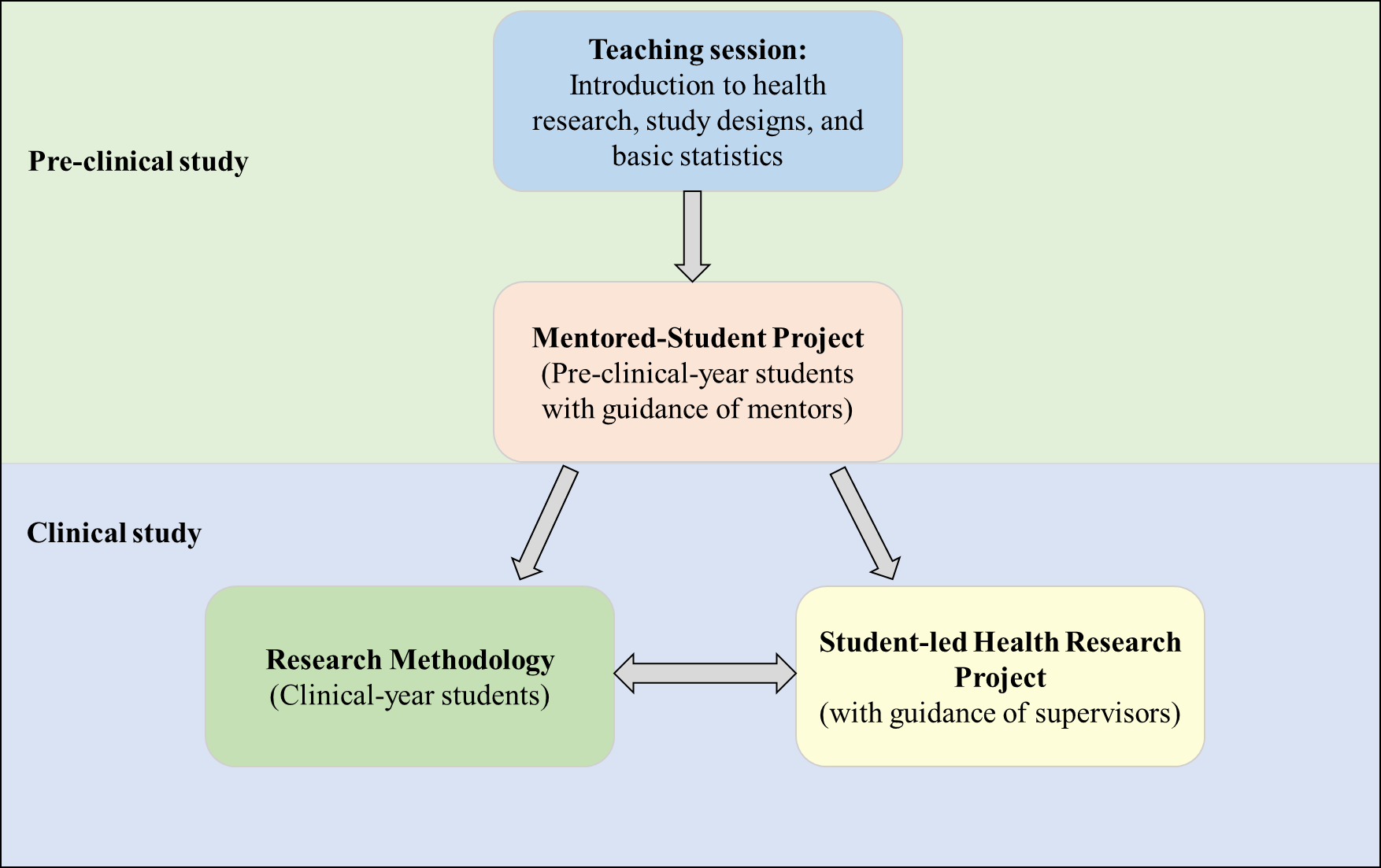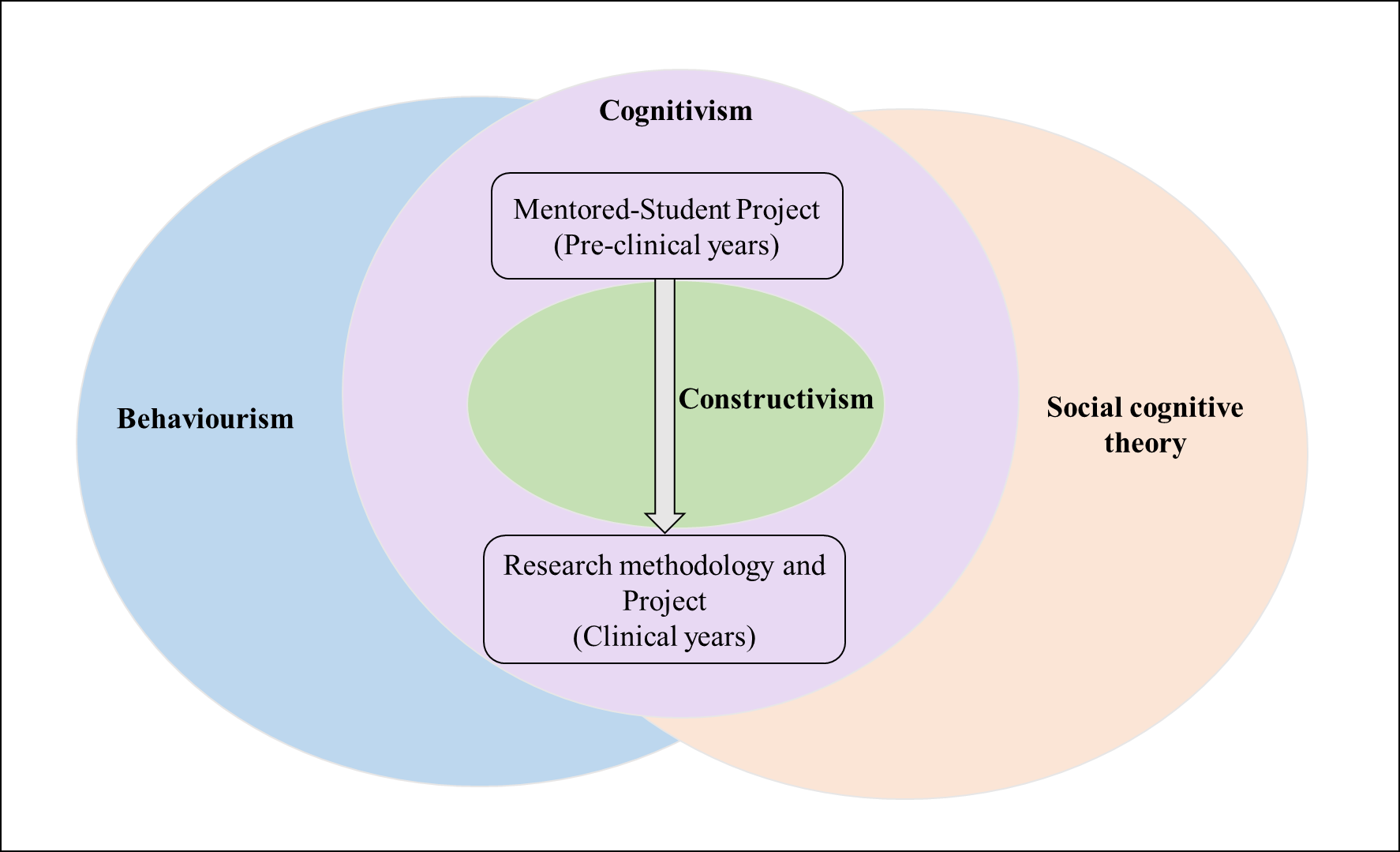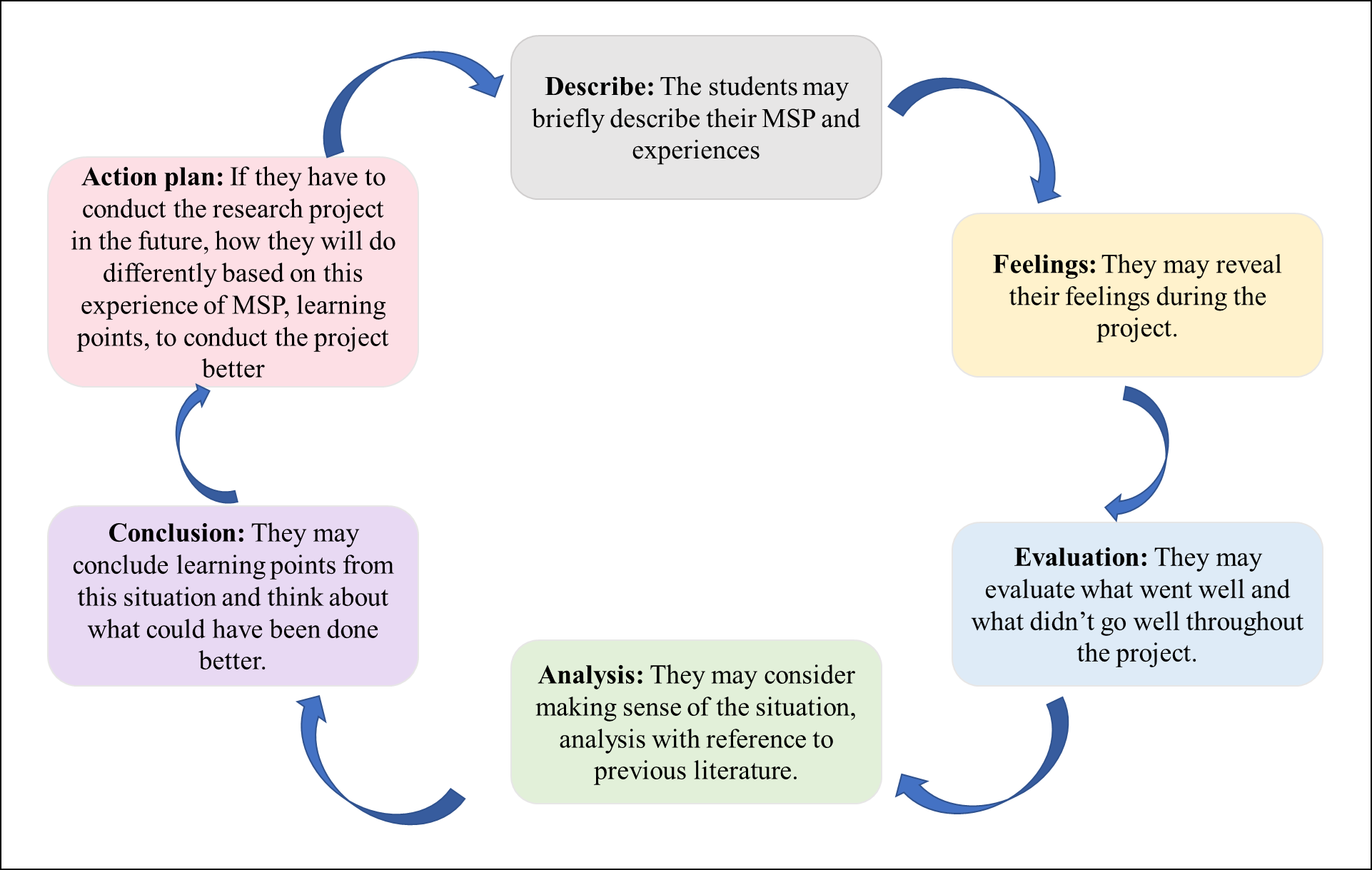Introduction
Educational theory is a concept or framework, which is important to design the curriculum, implement the teaching strategies, and plan the evaluation.1 Various educational theories have been explained in adult learning process and some theories were overarching to each other.2 Understanding the fundamental concept of educational theories could help the teachers to reflect upon their task and could improve the strategies to achieve the targeted learning outcomes.1 Furthermore, understanding how the students learn in different ways is crucial to plan for the most effective ways in teaching and learning process.2
Medical field is continuously evolving, and the current practice is focused on the evidence-based medicine.3 The dynamic progress in the medical research contributes for the wellbeing and better health outcomes in solving health problems.4 Therefore, there is a growing interest in the undergraduate research training and role of the academic supervisors in the curriculum.5 Systematic, structured training on research methodology, conducting health research projects, and critical appraisal will equip undergraduate medical students to develop the research and appraisal skills to apply them in their future career.4
Continuous exposure to health research project throughout the study years is a strategy to improve their research skills. Introducing to research project with the guidance of mentor is practicing in medical universities.6 The mentored-student project (MSP) is conducted during the pre-clinical years starting from the identification of a research problem till the presentation of results as a poster presentation.6 The students research knowledge and skills were proven to be improved after MSP7 and improved their communication skills and teamwork.8 Upon reflection, the students appreciated the benefit gained from their MSP.9
When the students get to the clinical years, the research methodology teaching and student-led research project training are continued to build on their core knowledge in research. two educational theories and one key principle for each theory that I could directly apply to my current teaching and training to undergraduate medical students. During the clinical year research training, the students reported their positive attitudes towards biostatistics in terms of affect, cognitive competence, value, interest, and effort.10 The overview of health research training is presented in Figure 1.
This review aimed to present the overarching educational theories related to adult learning process during the research methodology and research project training will be explained. Moreover, the example principles related to the educational theories and its’ application for research training will be discussed. It will be beneficial for the medical educators to understand the learning theories related to medical research training and to train the students effectively.
Behaviourism
Behaviourism is one of the older educational theories which enhance the learning process by providing motivation, reinforcement, and constructive feedback from the teacher.11 Among the behaviourist philosophy of educational theories, conditioning and B.F. Skinner’s reinforcement are well known in the field of medical education and clinical trainings.12, 13 In conditioning theory, the leaner’s behaviour is dependent on the external stimulus from the environment. A study was conducted among nurses to reduce absenteeism by providing reward system. This external reward stimulus effectively reduced the number of absenteeism in the hospital setting.14 B.F. Skinner further explained about behaviourism by using positive reinforcement, negative reinforcement, punishment, and extinction.15 Positive reinforcement based on the concept of rewarding to the desirable behaviour to be compliance more effectively. Negative reinforcement is the removal of unpleasant stimulus to improve the desirable outcome. As an example, eliminating additional homework or assignment if the students accomplish and achieve the leaning outcomes in the class.16 While the suppressive effect of punishment and extinction could eliminate the undesirable action being repeated.17
Behaviourism: A key principle and application
An example of a key educational principle which could relate with behaviourism is “Reinforcement and motivation are essential in the development of desired skills in health research training”.
During the research teaching and training process, teachers, mentors, or supervisors play a crucial role. They could guide for topic searching, relevant literature reviews, advising on research methodology, providing guidance throughout the research project.18 Throughout the training period, teachers should observe their students’ behaviour, their interest, continuous monitor on the progress, and evaluate their work.12 The positive reinforcement could be applied in every step of the process. From the perspective of the students, they expected to get constant encouragement, support, and motivation from their supervisors during undergraduate research training.19 Therefore, behaviourism educational theory could apply in health research teaching and training programme. The overview of educational theories related to the undergraduate health research training is presenting in the Figure 2.
Cognitivism
Cognitivism is a learning theory which focuses on how the learner process and store the information and how the new information is integrated to the existing knowledge.1, 20 The cognition of the students including insights, information procession, perception and memory will facilitate in their learning process.21 The cognitivism focuses on the memory process of storing a new knowledge, namely “(1) Encoding: how information is taken in, understood, and altered to better support storage, (2) Storage: storing and retaining encoded information within the memory system, (3) Retrieval: accessing stored information”.1, 21, 22 Since this learning theory is rated to the individual students’ cognitive process, it might not be able to observe directly. Therefore, the teacher should understand the cognitive learning process and should facilitate on this process.1
Cognitivism: A key principle and application
“Research methodology teaching sessions should be designed to correlated with the working memory on medical research project”
In medical education, the basis step of leaning process is understanding and memorizing basic knowledge in related field. The healthcare professionals should be critical thinkers, however, being a memorizer role at the initial stage could not be ignored.23 Chunking information could be easier for the students to remember, and therefore, the knowledge on research methodology should be delivered as elements (chunks).23
In undergraduate medical curriculum, health research exposure is initiated during pre-clinical years by introducing chunks of knowledge on overview of health research, methodology, basic statistical analysis, and presenting the findings. These teaching sessions are designed to be applicable with the working research projects with the mentors’ guidance.
Constructivism
In constructivism theory, the learners construct knowledge adding on prior experience.24 Leaning should be in a realistic setting and active involvement of the learners are essential. Upon critical reflection, the learners construct and incorporate their new learning knowledge and experience to their prior knowledge.25, 26 The role of the teachers is not to transmit the subject knowledge but to facilitate and engage the learners in the process.27
In a constructivist way of teaching, teachers should be interactive, stimulate to bring back prior knowledge of learners to incorporate into the current process, encourage to ask questions and participate in a two-way discussion between teachers and learners.25 From the perspective of learners, active participation in group (team) work, project presentation, critical reflection on the learning experiences could be an asset in their learning process.25
Constructivism: A key principle and application
“Learning is an interactive process based on prior knowledge, participation in the research project, self and group reflection”
In the clinical-year medical research projects, the learning process is based on prior theory knowledge about study designs, methodology, and former experiences at MSP during pre-clinical years. Participating and learning in research projects cultivate learners' interest in medical research, innovation, critical appraisal, problem-solving, and life-long learning.4 Learning through research projects has shown improvements in learners in terms of knowledge, skills, and satisfaction on learning in previous research studies.28 Constructivism theory includes exposing learners to new experiences, active engagement in the process, and in-depth reflection on the new experience,27 which could be related to the teaching principle.
In the undergraduate medical research project, a small group of students should conduct their own project (approximately five students in each group). Once the students start the research, they will be encouraged to initiate the topic selection, selection of research study design based on their pre-existing knowledge and prepare the research proposal. The role of the teacher is just guiding and facilitating the process. This is in line with the constructivist principle in which teachers’ role is to facilitate and engage the learners in the process.27 Furthermore, the teachers could ask the students to reflect on their previous experience on the “Mentored Student Project”. Gibb’s reflective cycle could be used as a guiding framework. The students should be able to reflect by using the following steps in Figure 3.
In constructivism, the students actively construct new learning or experience to the pre-existing knowledge.30 However, if the students have limited prior knowledge of health research, they might have a struggle at this stage. Therefore, a guided topic section and revision on study designs could be beneficial for the students. Moreover, training on enriched reflection writing is essential to hone constructivism.
Social Cognitive Theory
Social cognitive theories underpinned learning as a social group activity, having interaction among learners, observation, teamwork, and peer learning. The learners gain new concepts, experiences founded on the social interaction in the learning process.31 Interactive communication among students either face-to-face or online learning environment improves interest and motivation among the learners.32 Furthermore, interaction with peers enhances bonding, a sense of belonging, improves team spirit, and gains personal growth.33 Lave and Wenger (1991) explained situated learning where the learning process is carried out through collaboration, and inter-professional activities. While working in a collaborative team, not only active participation but also observation of their peer’s experience could be a learning process.34 Working with others could extend beyond the individual’s targeted achievement. It is described as beyond reaching the “zone of proximal development” by Vygotsky.31
Social cognitive theory: A key principle and application
“Leaning could be enhanced through active participation and commitment in teamwork in the medical research project”
It is believed that actively participating in each step of the research project, learning from peers, appreciating constructive feedback from peers, and commitment towards their project is crucial to achieving their learning outcomes. According to Lev Vygotsky, interaction, cooperation, and teamwork with peers develop learning in the natural context.35, 36 Since the nature of undergraduate research projects needs brainstorming, discussion, collaboration, allocation of the task, and teamwork in a real-life setting, the social cognitive theory implies in this context.
In order to apply the education theory and principle, the supervisor could encourage to discuss among group members starting from the title search and selection process. Each of them will be continuously monitored by the supervisor and ascertain their contribution in each step of the research project.
Furthermore, formative peer feedback for each step is introduced to the project. As an example, during the research title selection process, the individual student should identify three potential topics. During the group discussion, the provision of peer feedback for an individual topic on limitations and advantages is encouraged. Finally, the whole team makes consensus and agreement to select the final topic. Peer observation and the provision of constructive feedback are acceptable and useful in the field of medical education.37 Collaboration and guidance from a more knowledgeable peer could enhance the learning beyond the individual learning process. This is explained as “. Zone Proximal Development” in social cognitive theory, which extended beyond the self-leaning when getting shared understanding, synthesizing the framework of the project together.36
Learners’ motivation is related to their effort and commitment to the learning process. The motivation could be intrinsic or extrinsic. Peer mentoring and motivation is found to be beneficial in the self-directed learning process in medical education.38 In addition to the motivation by the supervisors, peer motivation will be encouraged to provide in the team through their research project and report preparation. The social cognitive theory emphasizes social interaction, motivation, and learning. Bandura discussed that collective team goals, self-evaluation, peer feedback, and motivation postulate the progress of learning.39 Thus, to achieve the outcome of a successful research project, the social cognitive theory will be applied in the steps of a research project for active participation, motivation, and collaboration with peers.
Encouraging teamwork and peer feedback in research training may greatly affect the learners, given that each of the team members follows the way of providing support and constructive feedback. Working together in a team for title selection, proposal preparation, data collection, data analysis, and report write-up will be beneficial to learn from peers in line with the social cognitive theory. Although previous literature on the application of social cognitive theory in the health research project is scarce, it has been applied and proven the positive influence on the teamwork and life support training programmes,1 and employee workplace learning projects.40
However, some students with low self-esteem or with shyness may encounter difficulty with social engagement,40 peer discussion, provision of peer feedback, and processing the feedback from others.41 Therefore, a supervisor or a teacher should create a mentally safe learning environment, monitor and support throughout the project.
Conclusion
In this review, educational theories that are applicable to the health research training are discussed. Behaviourism is an old theory; however, it plays an important role in communication, motivation, and encouragement to the students to practice the intended behaviour. Understanding of cognitive memory process is beneficial to plan for the teaching and training sessions related to the research methodology to retain as working memory. Building upon the existing knowledge, constructivism learning theory explain about learning in real-life research projects, reflecting previous experience, and constructing knowledge, skills, and critical appraisal. Lastly, research project is a teamwork and social cognitive theory is in line with it for active participation, learning from peers and getting peers’ feedback, and extending beyond the individual’s targeted achievement. By applying the learning theories, the health research training in the curriculum could be optimized for the undergraduate medical students.



